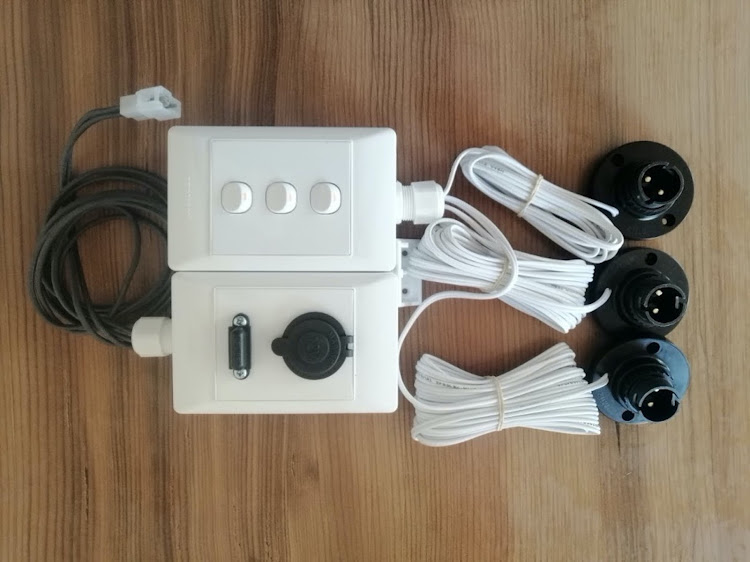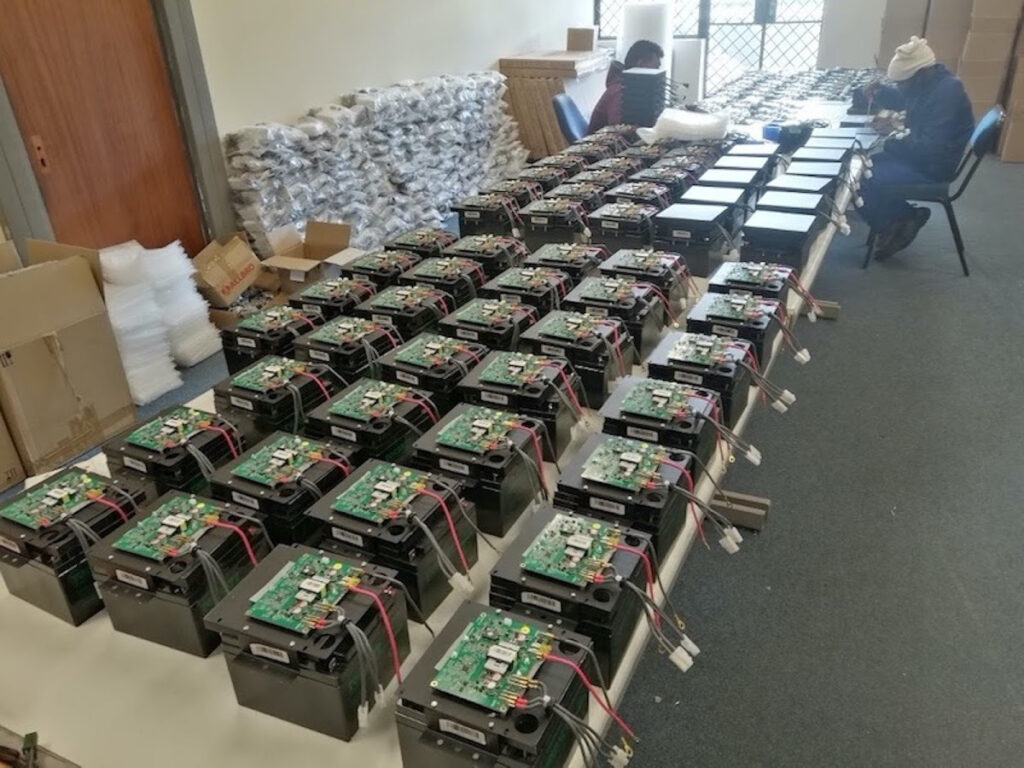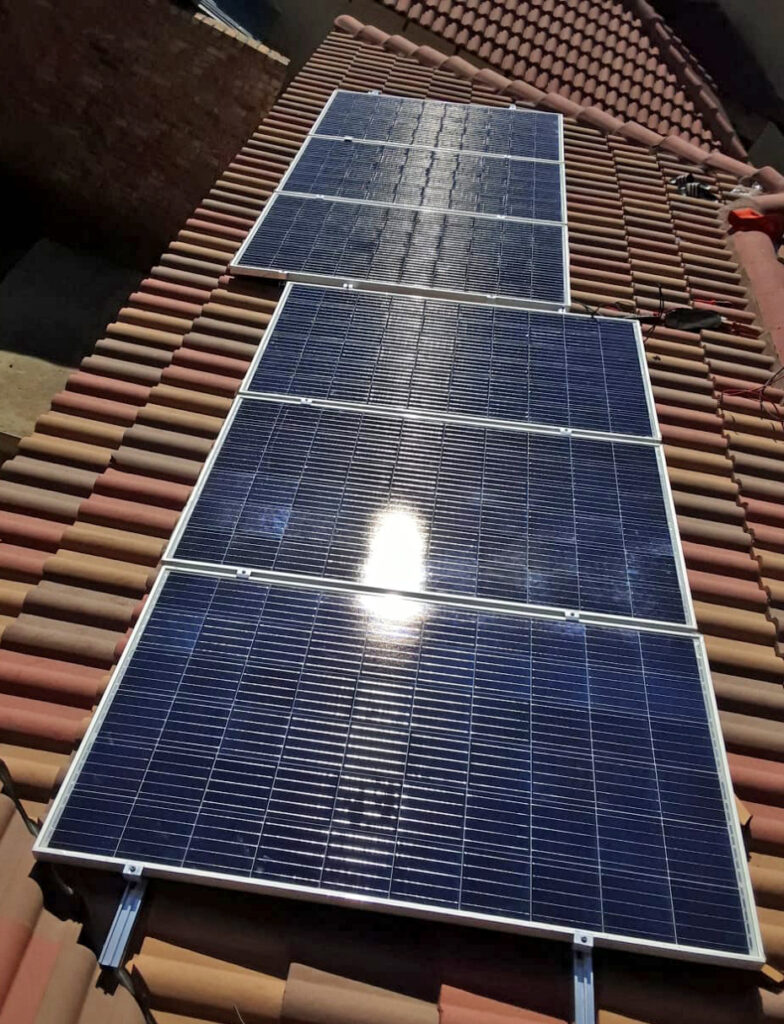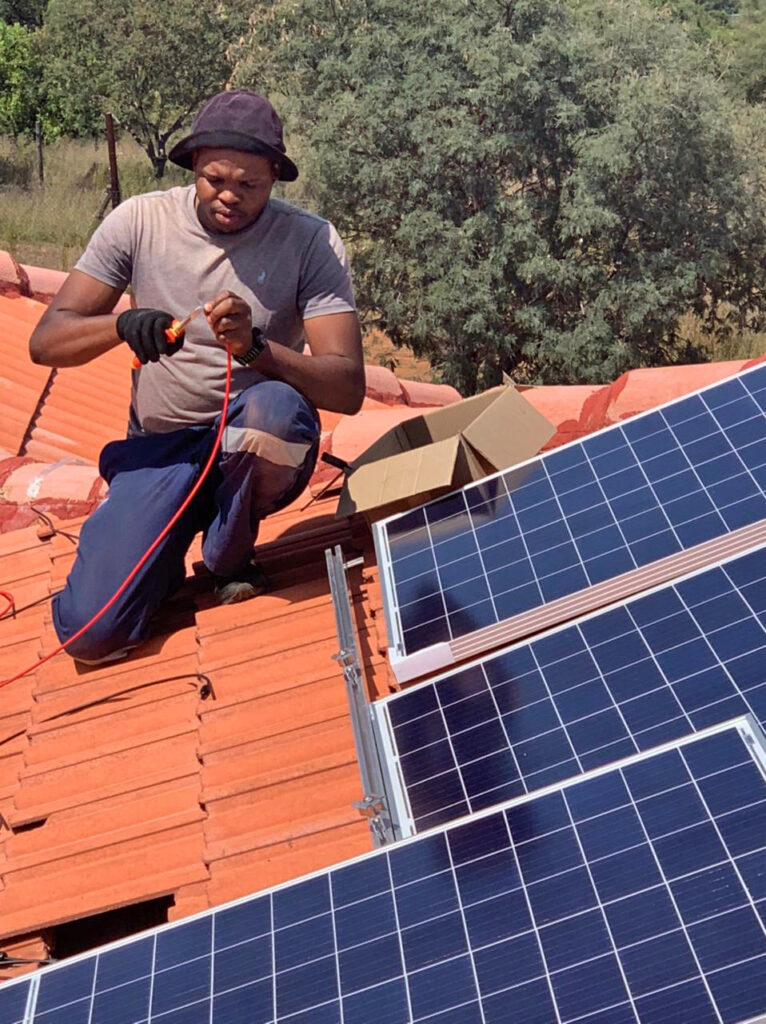The roll-out of solar and other sources of new energy will help reduce the air pollution of coal-fired power stations such as this one in Phola. (Photo: Lucas Ledwaba/Mukurukuru Media)
Solar innovation on the rise
Market analysts are predicting that South Africa’s solar energy market will experience significant growth in the next five years.
This is especially so in the photovoltaic (solar panel) market, due to supportive government initiatives and rooftop installation projects across the country, mainly in the commercial and industrial segment. The ongoing power crisis and government’s efforts to move towards cleaner energy to reduce the country’s carbon footprint is good news for innovators who are offering alternative solutions to consumers.
 A host of new clean energy products are now on the South African market
A host of new clean energy products are now on the South African market
Industry analyst Mordor Intelligence notes in a recent report that: “Due to increasing power outages in the country leading to the electricity crisis and increasing demand for continuous power, several opportunities are expected for the market players in South Africa to fill in the supply and demand gap. The government policies and increased investments in solar PV projects will increase the installed solar PV capacity of the country in the coming years.”
Smart Mini-Grid
Wits University has announced the development of the Smart Mini-Grid, which it said was developed and refined over the past four years by a team of innovators from the institution.
The Smart Mini-Grid is said to have the potential for wide and meaningful socioeconomic impact in rural and marginalised communities that don’t have access to electricity. It is designed to be affordable for low-income households and robust enough to survive demanding settings.
“It is expandable, which means that households can start small and grow their system over time, without losing the value of their initial investment. It can also be configured for a number of different applications. Being a true plug-and-play solution, no technical expertise is required for installation, operation or maintenance. As the Smart Mini-Grid operates on 12V DC, it poses no risk of electrocution and is considered safe,” the university said in a statement.
Professor Willie Cronje, who heads the Future Electrical Engineering Technology research group at the Wits School of Electrical and Information Engineering, said the system is flexible and modular, allowing households to build and customise their Smart Mini-Grid over time, according to their energy needs and budget.
He said the system resembled something “being built with Lego blocks.” It offers users a range of Smart Solar Blocks and Smart Storage Blocks with which the customer may build their Smart Mini-Grid, and the maximum usable power of a Smart Mini-Grid can be increased by adding additional Smart Blocks in a plug-and-play manner.
 As batteries improve, more energy from solar power can be saved by households for night-time use
As batteries improve, more energy from solar power can be saved by households for night-time use
“This means that households can start with a small Smart Mini-Grid of a few Smart Blocks and then build onto it, block by block. This bottom-up, modular and expandable approach to electrification is what sets PeCo Power apart from traditional solar home systems,” he said.
The specs for the Smart Grid include the PeCo Lite 50 bundle, which is described as an “affordable entry point into the PeCo Power lifestyle” and contains a 50W Smart Solar Block and a 24Ah Smart Storage block.
“The PeCo Lite 50 builds a Smart Mini-Grid that can yield up to 190Wh of solar energy and store up to 140Wh for night-time use. The PeCo Lite 50 provides up to 330Wh of daily maximal power. The PeCo Lite 80 is described as a bundle for those avid day-time users who need additional power during the day and hence comes with a larger 80W Smart Solar Block and a 24Ah Smart Storage Block. The PeCo Lite 80 builds a Smart Mini-Grid that can yield up to 320Wh of solar energy and store up to 140Wh for night-time use. The PeCo Lite 80 provides up to 460Wh of daily maximal power.”
GreenTower
Gauteng innovator Eco-V has developed and commercialised GreenTower technology, an internet connected solution that integrates solar energy, water treatment, disinfection and water purification, optimised and managed by software.
“GreenTower technology conserves potable water using treated borehole water where possible and recycling greywater for toilet and garden use. Purified ozone-treated water improves health naturally by oxygenation along with microbe, fungus, bacteria and virus disinfection for drinking, cleaning and bathing,” said Eco-V founder Andre Nel.
Its customers include elderly care facilities, property developers, farms, residential households, guest houses, industries, schools and universities that need improved energy, water, food and health security.
Nel said GreenTower microgrids improve energy and water security in large communities such as old age homes and schools by harvesting solar energy and alternative water sources. He said they aim to provide energy, water, and health security as a service at 1 000 large South African urban high schools within the next five years.
“GreenTower microgrids reduce utility water and electricity consumption significantly, helping local schools save on their monthly utility expenses,” Nel said.
 Solar energy is becoming popular as South Africa’s power challenges continue
Solar energy is becoming popular as South Africa’s power challenges continue
Advocate Pieter Holl, chief executive of The Innovation Hub where Eco-V is incubated, acknowledged the environmental challenges facing South Africa and how such innovations may make a difference.
“Water scarcity and pollution are major problems, not only for South Africans and our environment, but for our economy as well,” said Holl.
In 2018 Eco-V’s GreenTower was awarded a service excellence award by Gauteng premier David Makhura’s office for its work done at the Susan Strijdom old age home.
Nel said sustainability audits performed at a number of elderly care facilities have provided valuable insights.
“At Susan Strijdom home for the elderly in Pretoria the annual energy usage in 2016 was more than 313 000kWh. The kitchen was the largest single user of electricity, followed by water heating and the laundry. Monthly municipal water consumption was typically in excess of 800kl with about 25% of the water supply used for bathing and the laundry and up to 35% used for the garden,” he said.
Nationally Determined Contribution
Minister of Environment Barbara Creecy said in April that the government has released the revised Nationally Determined Contribution (NDC) for public comment ahead of the United Nations Framework Convention on Climate Change (UNFCCC) in November.
Creecy said the enhanced NDC “significantly boosts both mitigation and adaptation ambition. The document proposes emissions decline beginning in 2025 — a full 10 years ahead of our previous peak, plateau, decline trajectory”.
She said it further proposes that by 2030 our greenhouse gas emissions must decline by 28% compared to the current levels. “Government has set a measurable target in the IRP to increase renewable energy from the current 11% to 34% by installing well over 26GW of renewables by 2030. This will reduce the share of fossil fuels in energy generation from the current 80% to 51%.”
Creecy said: “We are currently processing the public submissions received and are awaiting advice from the climate commission before we process the final draft for approval by cabinet and submission to the UNFCCC.”
According to Mordor Intelligence, the solar PV installed capacity in 2020 grew by 37% compared to the previous year’s value.
“This huge growth in 2020 can be attributed to large-scale solar PV projects that were commissioned in that year. In addition to this, declining solar PV modules and associated system costs coupled with supportive government policies are expected to drive the market studied during the forecast period.
“On the flip side, increasing competition from alternative renewable energy sources such as onshore wind power, small-hydropower, and bioenergy is expected to restrain the market growth during the forecast period.”
Consumers want more solar
Electrician Morithi Manasoe has experienced a steep increase in clients who want to move from the power grid to solar in the past couple of years.
The Gauteng-based entrepreneur, who also operates in other provinces, says in a month he fields up to about 20 calls from customers eager to switch to solar power.
“Most of them mention load-shedding as the major reason they want to switch to solar. I take the opportunity to advise them about the benefits of solar, and that they should not think about it only as a solution to load-shedding,” said Manasoe.
He decided to include the installation of solar power among his services after noticing that fuel-powered generators create challenges for users, especially those in residential areas.
“I noticed that people were complaining of noise pollution. Generators also pollute the air with fumes, so they cause problems, especially in residential areas. That’s when I decided to research the solar business.”
 Electrician Morithi Manasoe installing solar panels
Electrician Morithi Manasoe installing solar panels
Now, he fields calls from farmers, various business outlets and residential residents across different provinces.
The switch to solar comes at an opportune time: government is in the process of investing in clean technologies in its bid to ensure a transition from a high- to low-carbon economy.
Solar energy fits with this as it is considered extremely safe and environmentally friendly. As the world battles to reduce air pollution levels, solar energy is among the preferred sources, because unlike other energy generation sources such as coal-powered stations, it has zero emissions — it is fuelled by the sun.
Research by the department of energy indicates that South Africa’s geographical location and all-year-round sunshine makes it a convenient location for deriving power from solar energy.
The department notes that most areas in South Africa average more than 2 500 hours of sunshine per year. “The annual 24-hour global solar radiation average is about 220 W/m2 for South Africa, compared with about 150 W/m2 for parts of the USA, and about 100 W/m2 for Europe and the United Kingdom. This makes South Africa’s local resource one of the highest in the world,” the department noted.
The department of water and sanitation is also increasingly using solar energy to pump water for its rural water provision and sanitation programme.
A market growth report by Mordor Intelligence, titled South Africa Solar Photovoltaic Market – Growth, Trends, Covid-19 Impact, and Forecasts (2021-2026), revealed that the solar photovoltaic (PV) market is expected to register a compound annual growth rate of over 10% during the forecast period of 2021-2026, reaching an installed capacity of more than 3.6GW by 2026, up from 1.48GW in 2019.
It also noted that despite the travel restrictions and supply chain disruptions, the solar PV installed capacity in 2020 grew by 37% compared to the 2019 value.
The department of energy previously established a pilot programme to establish a limited number of public-private sector institutions in conjunction with the relevant municipalities to provide electricity services on an integrated basis. Through the programme, service providers will own and maintain the systems.
Such projections augur well for independent solar energy traders such as Manasoe. He said that so far, business outlets favour back-up solar systems, which ensure they still have power during blackouts. Clients in residential areas favour the on-grid solar system, which allows them to maintain a balance and reduce high electricity costs. “It is very popular in urban areas — that is where there is a huge demand,” he said.
He explained that the on-grid system allows consumers to be able to balance their power consumption, connecting some of their appliances to the electricity grid while others are completely dependent on the solar system.
Manasoe said while businesses generally seem to be moving more towards going completely off grid, there appears to be reluctance on the part of Eskom and municipalities to assist those who choose to do so.
An off-grid installation can cost from as much as R70 000 depending on the size of the establishment, while a back-up system starts from around R25 000. Manasoe said while these costs may sound too high to some, the reality is that once it is connected, solar systems require minimal maintenance and reduce power costs substantially.
He encouraged small businesses, especially establishments such as laundries, salons, car washes, internet cafés, tuck shops and restaurants to consider using solar energy.
This would help not only these businesses to save costs, but also reduce the pressure on South Africa’s power grid.